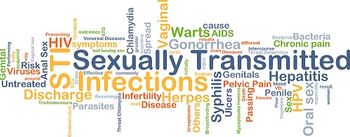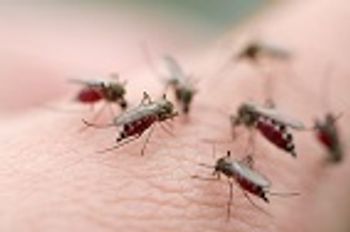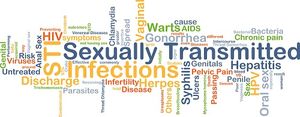
Researchers have found that individuals with cytomegalovirus retinitis have a more advanced HIV infection than individuals with ocular syphilis.

Researchers have found that individuals with cytomegalovirus retinitis have a more advanced HIV infection than individuals with ocular syphilis.

Researchers have found that cases of ocular syphilis have been increasing in North Carolina and that the prevalence of ocular syphilis was almost twice as high among HIV-positive patients as among those who were HIV negative or HIV unknown.

Centers for Disease Control and Prevention researchers find that in women who have rectal intercourse, rectal sexually transmitted infections chlamydia and gonorrhea can be almost as common as urogenital infections.

Recent research has revealed that some adolescents may be overtreated or undertreated for the sexually transmitted infections (STIs) chlamydia and gonorrhea when presenting to the emergency department (ED).

Researchers find that rapid diagnostic testing may be the key to improving testing and treatment for chlamydia and gonorrhea.

Research has found that women who were forced to have sex and were diagnosed with an sexually transmitted disease (STD) were less likely to receive treatment compared with women who did not experience forced sex.

Guidelines for the human papillomavirus (HPV) vaccine include recommendations on which populations of individuals should receive either the 2-dose or 3-dose regimen.

At the Centers for Disease Control and Prevention 2016 STD Prevention Conference, lead authors of several studies discussed how researchers are taking novel approaches to sexually-transmitted infection screening.

Rapid syphilis screening tests can be useful in community-based facilities, according to the results of five studies presented in a mini-plenary on September 22 at the Centers for Disease Control and Prevention 2016 STD Prevention Conference in Atlanta, Georgia.

At the Centers for Disease Control and Prevention's 2016 STD Prevention Conference, researchers discussed three novel prevention strategies for HIV, other STIs, and unintended pregnancies.

“The number of people who experience the devastating effects of preventable infectious diseases like measles, diphtheria, and whooping cough is at an all-time low," according to the Centers for Disease Control and Prevention (CDC).

Technology gives men who have sex with men (MSM) new ways to assess their health status, prevent HIV and other STDs (sexually transmitted diseases), and find care.

Older Americans who are sexually active are not being tested for HIV and are not being educated about how to prevent disease transmission, new research suggests.

New prevention and treatment models are needed worldwide and one such model is the Dean Street Express Clinic in London, England.

Gonorrhea may soon become untreatable with current antibiotics, according to recent research presented at the Centers for Disease Control and Prevention's 2016 STD Prevention Conference.

When a health emergency erupts somewhere in the world, the Centers for Disease Control and Prevention (CDC) quickly sends its new Global Rapid Response Team (Global RRT).

Public health demands integrity, said Margaret Hamburg, MD, former commissioner of the US Food and Drug Administration (FDA), at the Centers for Disease Control and Prevention’s 65th Annual Epidemic Intelligence Service (EIS) Conference in Atlanta, Georgia.

Cutting-edge technologies help public health professionals detect and respond to infectious disease outbreaks more rapidly and effectively than traditional methods. The Centers for Disease Control and Prevention’s Epidemic Intelligence Service (EIS) officers presented a few of their resources to their colleagues in a special session on May 3, Using Advanced Molecular Tools to Direct Public Health Action, at the 65th Annual EIS Conference in Atlanta, Georgia.

“Vector-borne diseases are among the most complex of all infectious diseases to prevent and control. Not only is it difficult to predict the habits of mosquitoes, ticks, and fleas, but most vector-borne viruses or bacteria infect animals as well as humans,” according to the Centers for Disease Control and Prevention (CDC).

“An outbreak anywhere is a risk everywhere,” according to the Centers for Disease Control and Prevention (CDC). Officers of the CDC’s Epidemic Intelligence Service (EIS) are studying several emerging infections – those that have recently increased or show signs of increasing soon – and five researchers presented their results May 4 in the Emerging Infections session of the 65th Annual Epidemic Intelligence Service (EIS) Conference in Atlanta, Georgia.

An estimated 722,000 healthcare-associated infections occurred in acute care hospitals in the United States in 2011, and roughly 75,000 patients who acquired them died while still in the hospital, according to the Centers for Disease Control and Prevention (CDC).

Zoonotic diseases caused by viruses, bacteria, parasites, and fungi that are spread between animals and humans are quite common and scientists estimate that more than 60% of human infectious diseases are spread from animals.

Officers of the CDC’s Epidemic Intelligence Service (EIS) presented recent research on tuberculosis (TB) on May 3 in a session at the 65th Annual Epidemic Intelligence Service Conference in Atlanta, Georgia. A summary of the presentations is included in this article.

Public health leaders have serious concerns about influenza, according to Dan Jernigan, MD, MPH, director of the Centers for Disease Control and Prevention (CDC) Influenza Division during a session on influenza on May 2nd during the 65th Annual Epidemic Intelligence Service (EIS) Conference in Atlanta, Georgia.

Margaret Honein, MPH, PhD, chief of Centers for Disease Control and Prevention (CDC)’s Birth Defects Branch in the National Center on Birth Defects and Developmental Disabilities updated health professionals at a special session on Zika virus infection during the 65th Annual EIS Conference in Atlanta, Georgia.

As the Centers for Disease Control and Prevention (CDC) learns more about the threat of Zika virus infection on pregnant women and their growing fetuses, it will continue to share its knowledge with researchers, healthcare providers and the public.

Published: March 22nd 2017 | Updated:

Published: March 22nd 2017 | Updated:

Published: March 25th 2017 | Updated:

Published: March 27th 2017 | Updated:

Published: March 28th 2017 | Updated:

Published: March 28th 2017 | Updated: